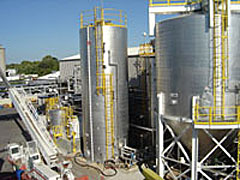Carthage - Renewable Environmental Solutions LLC (RES) yesterday announced that its first commercial plant is selling an equivalent of crude oil No. 4, produced from agricultural waste products. The Carthage plant is currently producing 100-200 barrels of oil per day utilizing by-products from an adjacent turkey processing facility.

Production and receiving area is shown at the RES plant in Carthage, MO.
RES is a joint venture of Changing World Technologies, Inc. and ConAgra Foods, Inc. established in 2000 as the exclusive vehicle for processing agricultural waste material utilizing CWT’s Thermal Conversion Process technology throughout the world.
TCP is the first commercially viable method of reforming organic waste into a high-value energy resource. The oil being produced by RES is being sold to a local oil blender and to customers who will use it as a heat source for their operations.
Because TCP utilizes above-ground organic waste streams to produce a new energy source, it also has the potential to arrest global warming by reducing the use of fossil fuels, and to create a means of energy independence by reducing U.S. reliance on imported oil. At peak capacity, expected to be achieved by the end of this year, the first-out plant will produce 500 barrels of oil per day, as well as natural gas, liquid and solid fertilizer, and solid carbon.
“Until now our focus has been on completing commissioning of the plant, but now that we are selling oil commercially, our focus is shifting to what we can do with the TCP technology in the bigger global picture,” says P.J. Samson, President of RES.
“TCP is based on simple science, and is the only proven solution to our mounting environmental and energy problems,” said Brian Appel, Chairman and CEO of CWT.
Cornerstone Technology
TCP succeeds in breaking down long chains of organic polymers into their smallest units and reforming them into new combinations to produce clean solid, liquid and gaseous alternative fuels and specialty chemicals.
The process emulates the earth’s natural geothermal activity, whereby organic material is converted into fossil fuel under conditions of extreme heat and pressure over millions of years. It mimics the earth’s system by using pipes and controlling temperature and pressure to reduce the bio-remediation process from millions of years to mere hours.
The process entails five steps:
- Pulping and slurrying the organic feed with water.
- Heating the slurry under pressure to the desired temperature.
- Flashing the slurry to a lower pressure to separate the mixture.
- Heating the slurry again (coking) to drive off water and produce light
hydrocarbons.
- Separating the end products.
TCP is more than 80% energy efficient. In addition, it generates its own energy to power the plant, and uses the steam naturally created by the process to heat incoming feedstock. In addition, TCP produces no emissions and no secondary hazardous waste streams.






Comments